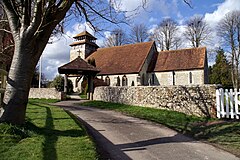Meonstoke
| Meonstoke | |
|---|---|
 St Andrew's church, Meonstoke |
|
| Meonstoke shown within Hampshire | |
| Population | 645 (2001 Census. parish) |
| OS grid reference | SU612203 |
| Civil parish |
|
| District | |
| Shire county | |
| Region | |
| Country | England |
| Sovereign state | United Kingdom |
| Post town | WINCHESTER |
| Postcode district | SO32 |
| Dialling code | 01489 |
| Police | Hampshire |
| Fire | Hampshire |
| Ambulance | South Central |
| EU Parliament | South East England |
| UK Parliament | |
| Website | Corhampton & Meonstoke Parish Council |
Meonstoke is a village in Hampshire, England. Meonstoke lies in the Meon Valley where it cuts through the Middle Chalk of the South Downs. Old Winchester Hill is at the edge of the parish to the east.
It sits on the eastern bank of the River Meon. On the northern part of the western bank is Corhampton. The A32 crosses the river between the two villages, which have formed a single civil parish since 1932. It is in this parish - namely - Corhampton and Meonstoke. On the southern part of the bank is Droxford. Soberton lies to the south of the parish, Hambledon to the east and Exton to the north.
Flint implements found near Old Winchester Hill suggest that the area that is now the parish of Meonstoke was inhabited over 20,000 years ago. Later, in neolithic times a roadway developed along the South Downs, passing south of Old Winchester Hill and crossing the River Meon at Exton. There is a Neolithic stone barrow on the southern slopes of Old Winchester Hill. Also on the Hill are eight Bronze Age barrows. Old Winchester Hill is the site of one of a chain of five Iron Age forts along the South Hampshire Ridgeway.
Roman remains have been found in the Meon Valley and during the 1980s, archaeologists uncovered parts of a Roman building in the village. Sections of the building's façade are now kept in the British Museum.
The Meonwara, a Jutish tribe settled in the Meon Valley in the 6th century, but the stoke in the village’s name is of Anglo-Saxon origin.
It is possible that Borough English or ultimogeniture the tradition of inheritance by the last-born of a parent's estate, which was recorded in the village as late as 1801, began with the Meonwara.
...
Wikipedia

